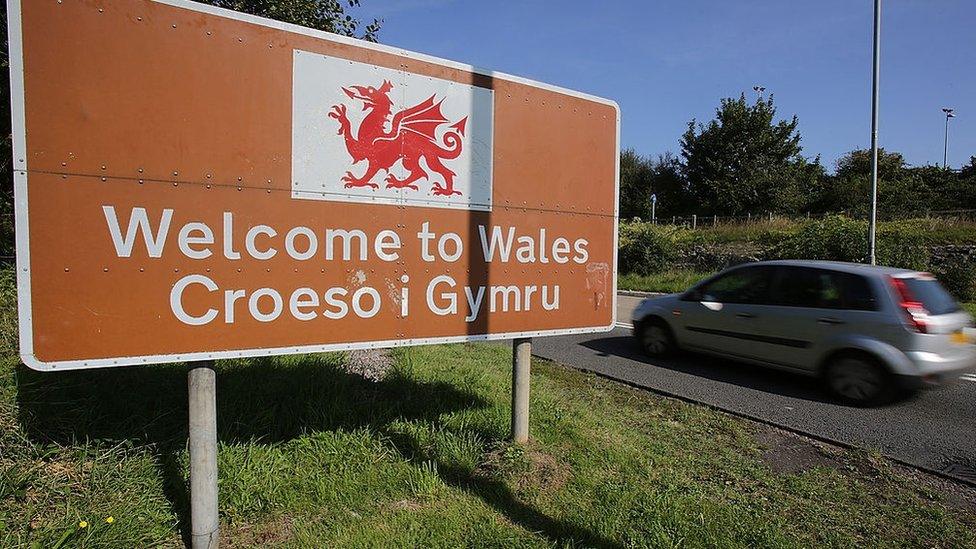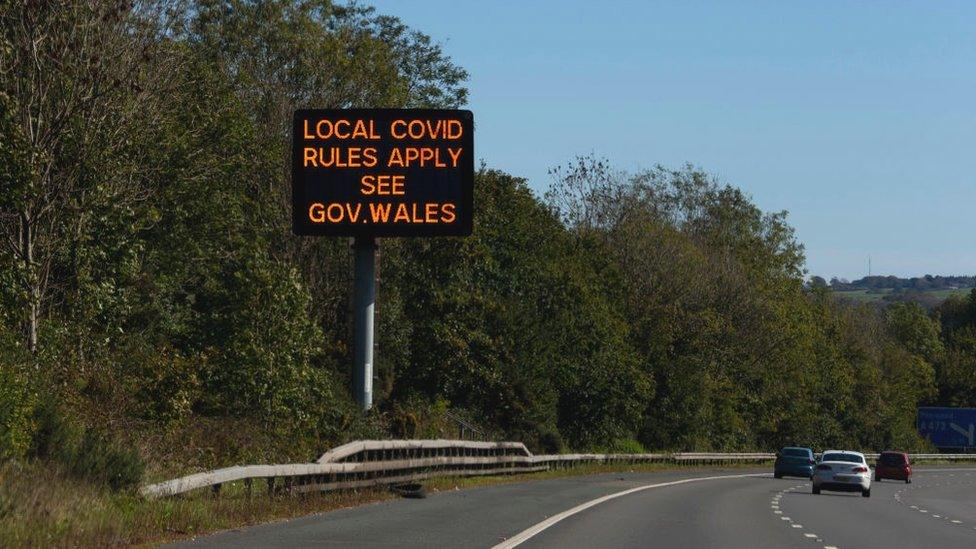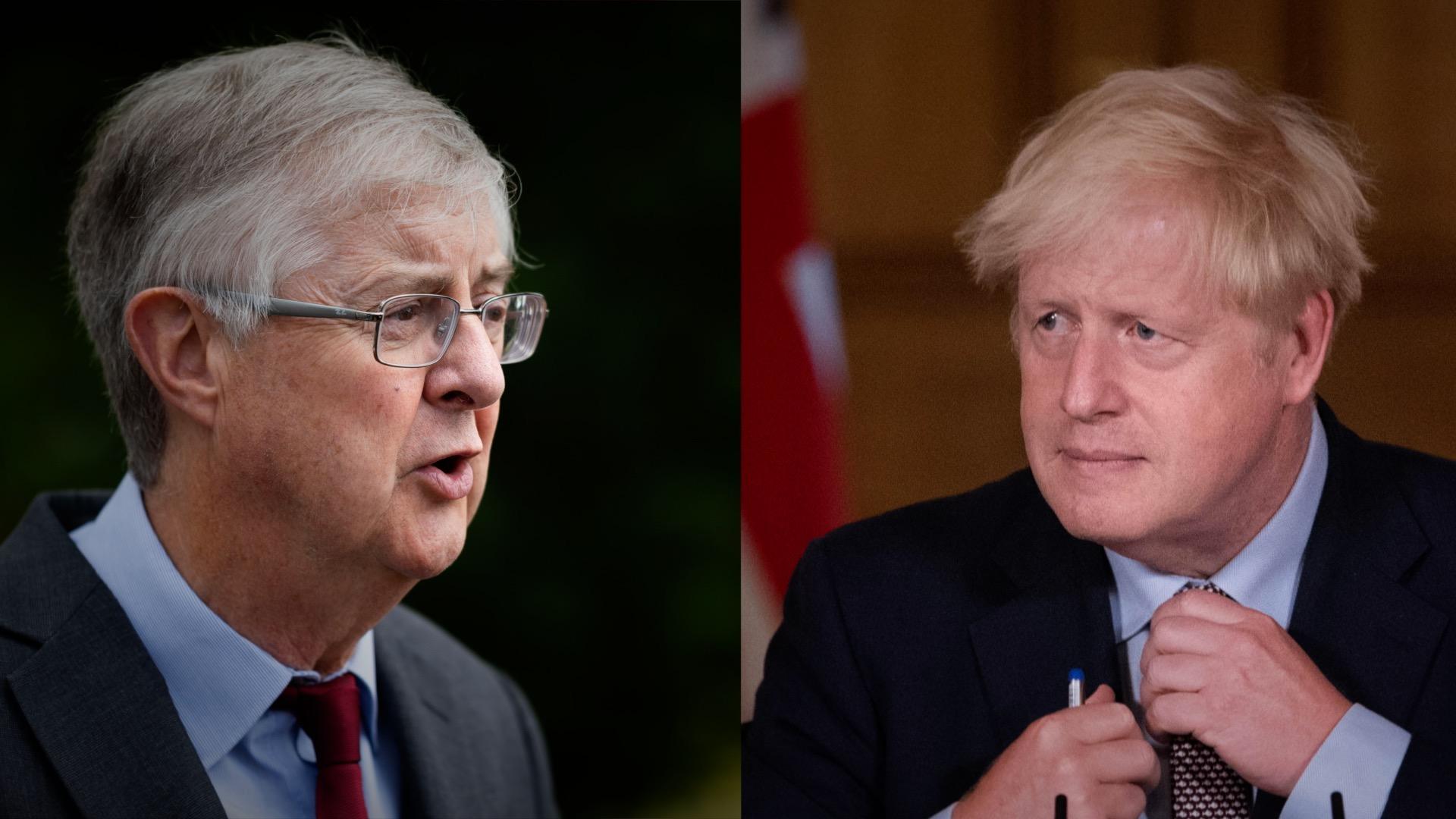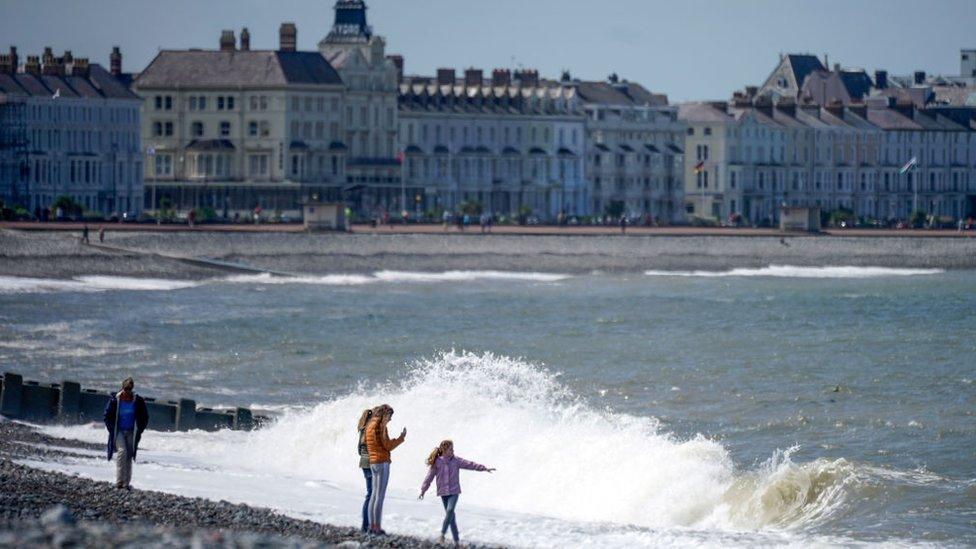Covid: Welsh quarantine considered for UK coronavirus hotspots
- Published
Vaughan Gething said English hotspots would face Welsh quarantine rules if they were countries
People travelling to Wales from Covid hotspots elsewhere in the UK could face quarantine under measures being considered by the Welsh Government.
Health Minister Vaughan Gething said he was looking at how powers could be used to protect areas with lower cases.
It comes after the prime minister rejected calls from Welsh ministers for a travel ban.
Currently people in lockdown areas in England can go on holiday in parts of Wales not subject to restrictions.
It is illegal for people to leave or enter lockdown counties Wales except for a limited set of reasons, like work or education.
But a similar law does not exist for areas under local restrictions in England.
UK Health Secretary Matt Hancock said the Westminster government felt it was more "appropriate" to put "travel restrictions in guidance rather than in law".
Mr Gething said if some English areas were countries Wales "would have quarantine regulations for them".
But he said there was "no good reason" to prevent someone from a low incidence area like Devon from travelling to Pembrokeshire.
"We're having to consider how we use our powers to protect lower-prevalence areas of Wales but at the same time, we don't want to take a whole-nation approach," Mr Gething said.
Prime Minister Boris Johnson said he did not want to impose travel restrictions
First Minister Mark Drakeford had written to Prime Minister Boris Johnson last week, asking for travel restrictions to prevent people visiting Wales from areas under lockdown in England.
But Mr Johnson told BBC Wales: "We are all one country, people should exercise their common sense."
Mr Gething said it was "disappointing" Mr Johnson did not respond to the letter.
He added that if people travelled from an area like Liverpool there was a risk of "spreading events".
'Dramatic action'
The Conservative health spokesman in the Senedd, Andrew RT Davies, said bringing in quarantine restrictions for people travelling to Wales from Covid hotspots in England was a "dangerous slope" for the Welsh Government to go down.
"If you start introducing such quarantine restrictions in Wales does that mean then there's a quid pro-quo that England, Scotland and Northern Ireland will start doing the same for Welsh residents?
"There are all sorts of questions to be answered before you even entertain implementing such dramatic action."
Plaid Cymru leader Adam Price said he had called for measures to limit travel with Mark Drakeford for "two weeks running".
"At a time when we need to act quicker and smarter to eliminate the virus, it's regrettable that it took the UK government's negligent dismissal of travel restrictions to bounce the Welsh Government into action," he said.

Could visitors to Wales face quarantine when they arrive?
How are the restrictions different?
In Wales it is illegal to enter or leave the 15 locked-down council areas, and the the town of Llanelli, without a "reasonable excuse". That can include:
For work, if you cannot work from home
For education
To seek medical assistance
To provide or receive emergency assistance
To meet a legal obligation, and to access or receive public services
Travelling through the areas is legal, but breaches can be punished with fines, with a fixed penalty notice of £60 for a first offence.
There is no similar legal restriction in England, although people in areas like Merseyside, Halton and Warrington, external have been asked to avoid non-essential travel.

The way lockdown restrictions work differs between England and Wales
'Huge disruption'
In the Commons the Labour MP for Swansea West, Geraint Davies, asked Mr Hancock if people travelling from England should quarantine when arriving in Wales.
Mr Hancock said in response: "The primary transmission of the disease is between households and between households mixing with each other".
"And the approach that we've taken thus far in England since we came out of the initial full blown lockdown has been to put travel restrictions in guidance, rather than in law, because we felt that's the most appropriate thing to do.
"I know that's not the approach that they're taking in Wales, but that's how we are currently handling it in England".
James Davies, Conservative Vale of Clwyd MP, said the travel restrictions in north Wales have caused "huge disruption" to half a million people.
Mr Davies said people had not been allowed to cross "often meaningless county council boundaries."
The health secretary added that he had shared proposals for a "simplified" approach to local lockdowns with the devolved governments.
The UK government is understood to be planning a new three-tier approach to local coronavirus restrictions in England.
Mr Hancock said he had discussed these plans with Mr Gething and that it would "simplify further if it were undertaken across the UK."
What has the UK government said?
A UK government Department of Health and Social Care spokesperson said: "We work closely with local leaders and public health teams to inform decisions on local interventions, taking into account a range of factors."
Public Health England, the Joint Biosecurity Centre and NHS Test and Trace "are constantly monitoring the levels of infection across the country," the spokesperson added.
"We discuss measures with local directors of public health and local authorities, constantly reviewing the evidence and we will take swift targeted action where necessary."
Data glitch 'does not affect Wales'
A data glitch that has delayed test results in England has not impacted Wales, an official has said.
An investigation is under way after nearly 16,000 coronavirus cases went unreported in England, delaying contact tracing efforts.
Giri Shankar, incident director at Public Health Wales, said: "Preliminary findings from a Department of Health and Social Care analysis have indicated that this issue has not affected Wales, either in terms of data reporting, or in terms of contact tracing under Test, Trace, Protect.
We continue to stay in close contact with the DHSC about this," he said.
- Published2 October 2020

- Published29 September 2020
